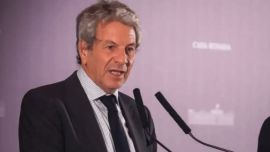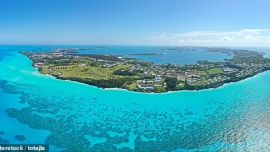Argentina became the first country in Latin America to recognise non-binary gender identities in its national identification cards and passports on Wednesday, offering individuals the choice to have their sex marked as an ‘X.’
In a first for the region, any applicant who does not identify as either male or female can tick a third box that will cover a variety of options, including non-binary, unspecified, undefined and "another meaning which can be used to identify a person who does not feel understood under the male/female binary," according to a decree published in the Official Gazette.
This new option, which extends beyond the standard male/female binary, is meant to safeguard gender identity, and comes after such a move has been under consideration since 2012.
The use of the "x" has already been accepted by the International Civil Aviation Organisation (ICAO) and includes people who identify outside traditional gender definitions.
At a ceremony at the Bicentennial Museum, next to the Casa Rosada, in Buenos Aires on Wednesday President Alberto Fernández personally handed over the first three documents issued under the new rules to individuals who had taken up the option.
"There are other identities besides that of man and woman, and they must be respected," said Fernández in a speech, adding that there are "a thousand ways to love and be loved and be happy."
"The government should not care about the gender of its citizens," declared the Peronist leader, who was accompanied at the event by campaigners, non-binary citizens, Interior Minister Eduardo ‘Wado’ de Pedro and Women, Gender & Diversity Minister Elizabeth Gómez Alcorta.
Fernández has been an advocate of progressive social reform, pushing legislation through that legalised abortion in Argentina late last year. He said that he believed his country's embrace of same-sex marriage, under a law in force since 2010, "was the beginning of this whole path towards diversity."
"The ideal will be when all of us are just who we are, and no-one cares about people's gender," he said in his speech. "This is a step we are taking and I hope one day we get to the point where IDs don't say if someone is a man, woman or anything else."
The president’s son, Estanislao Fernández, a design student and a well-known drag queen who goes by the stage name ‘Dyhzy,’ said Wednesday that they would update their DNI with an ‘X,’ in support of the change as a “non-binary person.”
“When the State recognises a law, that law becomes naturalised. Today it is not unusual, it does not attract attention, to see a homosexual couple getting married, since same-sex marriage was approved,” the 26-year-old said in a live Instagram Q&A.
The Argentine LGBT Federation (Federación Argentina LGBT) celebrated what it defined as a "historic advance in the matter of rights." It hailed the "activism of organisations" that had pushed the reform through.
"Although the use of the 'X' is not totally inclusive, in recognition of the wide range of identities that exist, it is an important step on the way to real equality of rights," the Federation said in a statement.
Those feelings were echoed by at least one individual at the ceremony, who upon receiving their new non-binary DNI, unzipped their jacket during the event to expose a message that read: "We are not an X."
Argentina also recently introduced a quota for transgender workers in the civil service, guaranteeing them one percent of state jobs.
According to the presidential decree, “the right to identity has a direct and indissoluble link with the right not to suffer discrimination, to health, to privacy and to carry out one's life plan."
Documents in which non-binary individuals can express their identity are currently being used in only a small group of countries, including Canada, Australia, New Zealand and Germany.
– TIMES/AFP

























Comments